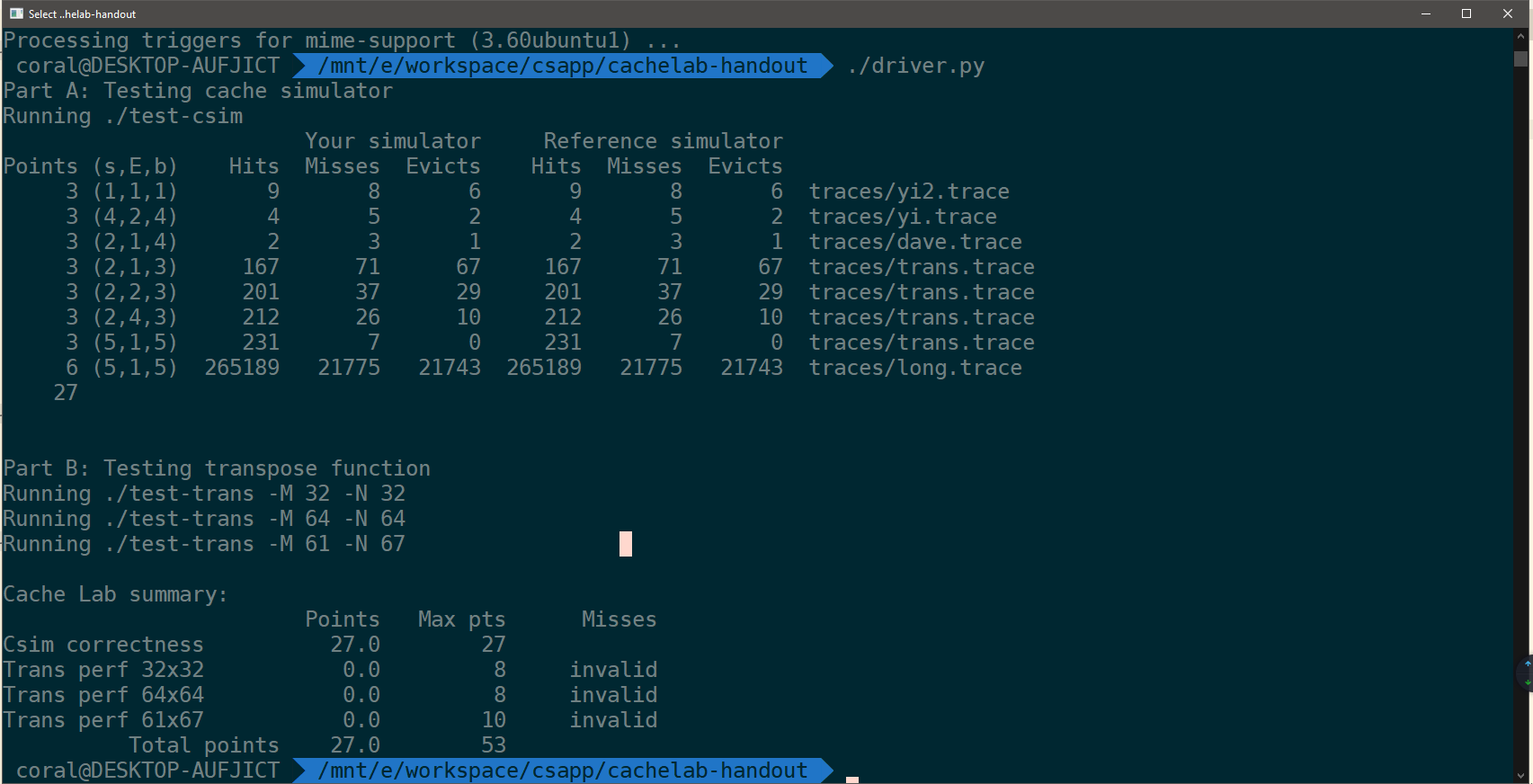1
2
3
4
5
6
7
8
9
10
11
12
13
14
15
16
17
18
19
20
21
22
23
24
25
26
27
28
29
30
31
32
33
34
35
36
37
38
39
40
41
42
43
44
45
46
47
48
49
50
51
52
53
54
55
56
57
58
59
60
61
62
63
64
65
66
67
68
69
70
71
72
73
74
75
76
77
78
79
80
81
82
83
84
85
86
87
88
89
90
91
92
93
94
95
96
97
98
99
100
101
102
103
104
105
106
107
108
109
110
111
112
113
114
115
116
117
118
119
120
121
122
123
124
125
126
127
128
129
130
131
132
133
134
135
136
137
138
139
140
141
142
143
144
145
146
147
148
149
150
151
152
153
154
155
156
157
158
159
160
161
162
163
164
165
166
167
168
169
170
171
172
173
174
175
176
177
178
179
180
181
182
183
184
185
186
187
188
189
190
191
192
193
194
195
196
197
198
199
200
201
202
203
204
205
206
207
208
| #include "cachelab.h"
#include <stdio.h>
#include <stdlib.h>
#include <getopt.h>
#include <math.h>
typedef int bool;
#define true 1
#define false 0
unsigned long time = 0;
bool v_mode = false;
int s = 0, E = 0, b = 0;
char *file = "";
unsigned hit_count = 0, miss_count = 0, eviction_count = 0;
void getOpt(bool *v_mode, int *s, int *E, int *b, char **file, int argc, char **argv);
void access(unsigned long address);
typedef struct
{
bool valid;
unsigned long tag;
unsigned long last_used_time;
} Line;
Line **cache = NULL;
int main(int argc, char **argv)
{
getOpt(&v_mode, &s, &E, &b, &file, argc, argv);
FILE *trace_file = fopen(file, "r");
int S = 1<<s;
cache = malloc(sizeof(Line *) * S);
for (size_t i = 0; i < S; i++)
{
cache[i] = malloc(sizeof(Line) * E);
}
for (size_t i = 0; i < S; i++)
{
for (size_t j = 0; j < E; j++)
{
cache[i][j].last_used_time = 0;
cache[i][j].tag = 0;
cache[i][j].valid = 0;
}
}
char buffer[64];
char type;
unsigned long addr;
int m_size;
while (fgets(buffer, 64, trace_file))
{
sscanf(buffer, " %c %lx,%d", &type, &addr, &m_size);
switch (type)
{
case 'L':
access(addr);
break;
case 'M':
access(addr);
case 'S':
access(addr);
break;
default:
break;
}
}
for (size_t i = 0; i < S; i++)
{
free(cache[i]);
cache[i] = NULL;
}
free(cache);
cache = NULL;
fclose(trace_file);
printSummary(hit_count, miss_count, eviction_count);
return 0;
}
void access(unsigned long address)
{
int group = (address >> b)&((1 << s) - 1) ;
int tag = address >> (b + s);
for (size_t i = 0; i < E; i++)
{
if (cache[group][i].tag == tag && cache[group][i].valid == 1)
{
hit_count++;
cache[group][i].last_used_time=++time;
return;
}
}
for (size_t i = 0; i < E; i++)
{
if (cache[group][i].valid == 0)
{
cache[group][i].valid = 1;
cache[group][i].last_used_time = ++time;
cache[group][i].tag = tag;
miss_count++;
return;
}
}
eviction_count++;
miss_count++;
unsigned long lru_time = -1UL;
unsigned line_index=0;
for (size_t i = 0; i < E; i++)
{
if (cache[group][i].last_used_time < lru_time)
{
lru_time=cache[group][i].last_used_time;
line_index=i;
}
}
cache[group][line_index].last_used_time=++time;
cache[group][line_index].tag=tag;
printf("test\n");
}
void getOpt(bool *v_mode, int *s, int *E, int *b, char **file, int argc, char **argv)
{
char opt;
while ((opt = getopt(argc, argv, "v::s:E:b:t:ma")) != -1)
{
switch (opt)
{
case 'v':
*v_mode = true;
break;
case 's':
*s = atoi(optarg);
break;
case 'E':
*E = atoi(optarg);
break;
case 'b':
*b = atoi(optarg);
break;
case 't':
*file = optarg;
break;
case '?':
fprintf(stderr, "Usage: %s [-hv] -s <num> -E <num> -b <num> -t <file>\n\
Options:\n\
-h Print this help message.\n\
-v Optional verbose flag.\n\
-s <num> Number of set index bits.\n\
-E <num> Number of lines per set.\n\
-b <num> Number of block offset bits.\n\
-t <file> Trace file.\n\
\n\
Examples:\n\
linux> %s -s 4 -E 1 -b 4 -t traces/yi.trace\n\
linux> %s -v -s 8 -E 2 -b 4 -t traces/yi.trace\n",
argv[0], argv[0], argv[0]);
exit(EXIT_FAILURE);
default:
break;
}
}
}
|

